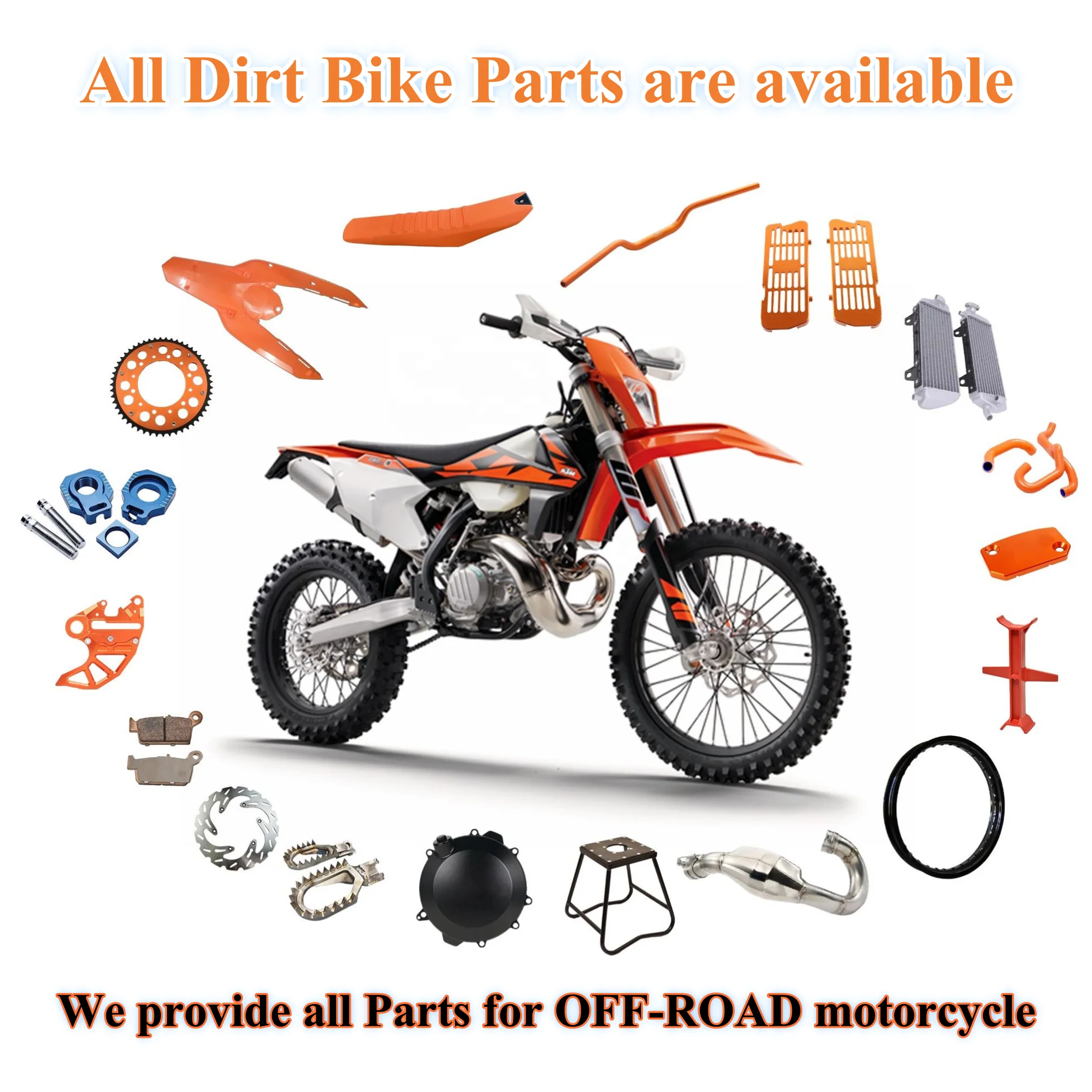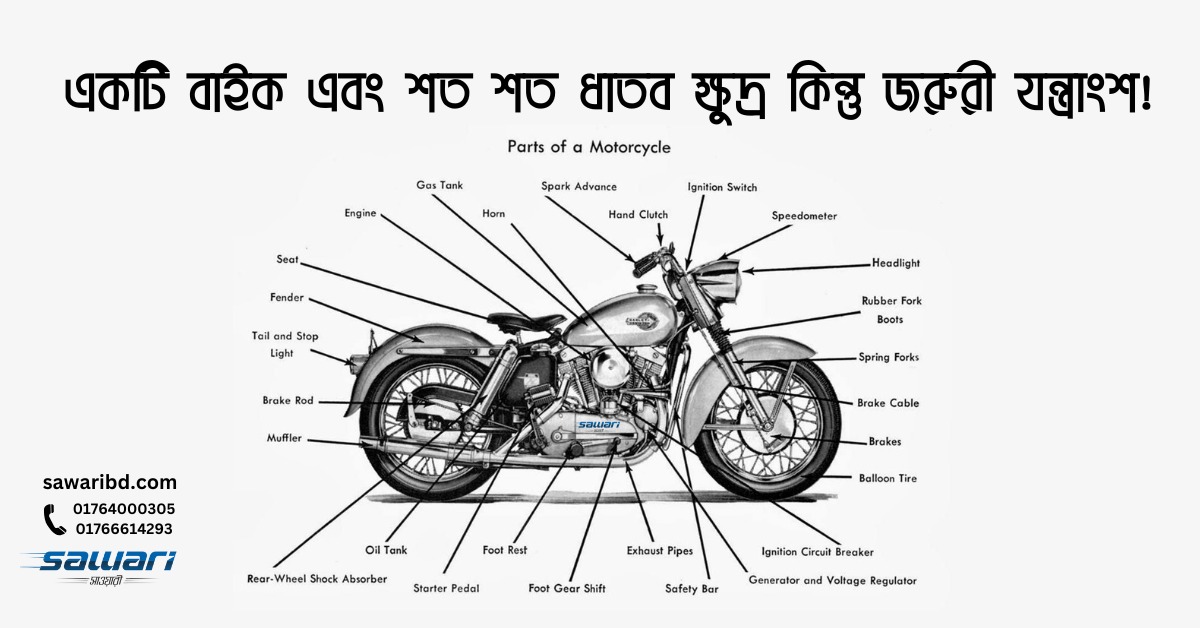Discover the Vital MotorBike Components You Need for Optimum Efficiency
Recognizing the crucial parts of a bike is fundamental for attaining peak performance. Each component, from the engine to the stopping system, plays an important duty in overall performance and safety and security. Routine maintenance can stop unforeseen failures and boost the riding experience. Nevertheless, many motorcyclists ignore the details of these systems. Finding how they collaborate can result in a much more effective trip. What essential parts should every motorcyclist prioritize?
The Engine: The Heart of Your Motorcycle
The engine functions as the core element of a motorbike, driving its efficiency and defining its capabilities. It is accountable for converting gas right into mechanical energy, which powers the bike ahead. Different kinds of engines are used, consisting of single-cylinder, V-twin, and inline configurations, each offering distinct features matched for different riding designs and objectives. The engine size, commonly gauged in cubic centimeters (cc), considerably influences efficiency, with bigger engines usually giving even more power and torque.Furthermore, the engine's layout and innovation, such as fuel shot systems or air-cooling versus liquid-cooling, influence efficiency and integrity. Upkeep is necessary for peak procedure; variables like routine oil changes and monitoring ignition system guarantee long life. Bikers typically consider an engine's responsiveness and level of smoothness, as these qualities improve the total riding experience. Ultimately, the engine stays an important component that specifies not only the motorbike's efficiency however additionally the rider's connection to the equipment.
The Transmission: Moving Gears Efficiently
The transmission plays an essential role in a motorcycle's efficiency, specifically in the technicians of gear changing. Understanding exactly how to move equipments efficiently can enhance the overall riding experience, while normal maintenance guarantees peak performance. Correct attention to these facets can greatly impact the durability and performance of the motorcycle.

Gear Shifting Mechanics
Smooth gear changing is essential for suitable motorbike performance, significantly affecting both acceleration and control. The mechanics of gear changing involve the interaction in between the clutch, equipment bar, and transmission system. When a motorcyclist involves the clutch, it disengages the engine from the transmission, enabling for an equipment modification without harming the parts. A well-timed launch of the clutch, integrated with accurate motion of the gear bar, facilitates a smooth modification in between gears. This process assures that the engine operates within its finest power band, boosting efficiency. Motorcycle Spares Christchurch. Additionally, comprehending the equipment ratios and their effect on speed and torque can assist bikers make notified options throughout changes, ultimately adding to an extra delightful and receptive riding experience
Upkeep Tips Relevance
Regular upkeep plays a necessary function in assuring that the transmission system runs effectively, permitting smooth gear shifts. On a regular basis checking and transforming the transmission fluid is crucial, as old liquid can result in enhanced friction and wear. Furthermore, examining the clutch for wear guarantees peak engagement and disengagement, avoiding slippage throughout gear adjustments. Lubrication of moving parts is just as crucial to minimize friction and boost efficiency. Motorcycle proprietors ought to also keep an eye on for leakages and unusual sounds, as these can suggest underlying problems. By adhering to these upkeep pointers, cyclists can prolong the life-span of their transmission system, guaranteeing that equipment shifts continue to be seamless and adding to the total efficiency of their motorbike.
The Braking System: Ensuring Security on Every Trip
Braking systems are basic elements that directly affect a motorbike's safety and security and performance. They consist of various components, including brake pads, blades, calipers, and hydraulic lines, all interacting to ensure effective slowdown. The type of stopping system-- usually either disc or drum-- affects responsiveness and quiting power.Regular upkeep is crucial to copyright peak efficiency; worn brake pads can result in lowered performance and raised quiting distances. Furthermore, the quality of brake fluid should be kept an eye on, as it can take in wetness with time, compromising braking efficiency.Riders need to also consider the relevance of anti-lock stopping systems (ABDOMINAL), which protect against wheel lockup during abrupt stops, boosting overall security. Effectively operating brakes are not practically stopping; they infuse self-confidence in the cyclist, enabling much safer navigation with different surfaces. Inevitably, a trustworthy stopping system is crucial for enjoying every experience with comfort.
The Suspension: Enhancing Convenience and Control
A well-functioning shock absorber substantially adds to a motorbike's total efficiency, matching the effectiveness of the braking system. The suspension plays a considerable duty in soaking up shocks from uneven surface areas, ensuring a smoother trip while preserving tire contact with the road. This call is essential for both stability and control, permitting motorcyclists to browse edges with confidence and precision.Different sorts of suspension systems, such as telescopic forks or mono-shocks, use varying levels of convenience and handling. Appropriately tuned suspension improves responsiveness, supplying the biker with a more linked feel to the motorbike. Normal maintenance checks are crucial to establish the suspension components, consisting of springs and dampers, are operating at their finest. An effective suspension system not just elevates the riding experience however also adds to the long life of other motorcycle components by lessening wear and tear. Therefore, buying quality suspension is essential for any type of significant motorbike enthusiast.
The Tires: Linking You to the Road
Tires play an essential duty in a motorbike's efficiency, acting as the main web link between the motorcyclist and the road. Understanding the different kinds of tires available can considerably impact managing and safety. Furthermore, normal maintenance is important to guarantee peak tire performance and long life.
Tire Types Explained
How do different tire types affect a motorbike's performance? Tire types play an essential duty in identifying a motorcycle's grip, stability, and handling. Sport tires, created for high efficiency, offer enhanced traction and responsiveness on paved roadways, making them ideal for competing and aggressive riding. On the other hand, exploring tires prioritize durability and comfort, supplying a smoother adventure for long-distance travel. Off-road tires, identified by their sturdy step patterns, master check out here traction on unpaved surfaces, appropriate for experience lovers. In addition, dual-sport tires mix qualities from both on-road and off-road classifications, accommodating flexible riding requirements. Eventually, picking the appropriate tire kind is crucial for optimizing performance, making sure security, and improving the general riding experience.
Maintenance Tips Offered
While riding when driving, keeping perfect tire condition is vital for safety and security and performance. On a regular basis inspecting tire pressure is necessary, as under-inflated tires can result in poor handling and increased wear. It is suggested to evaluate walk depth regularly; used tires compromise grasp and security. On top of that, cyclists should look for indicators of damage, such as bulges or fractures, which can suggest the requirement for replacement. Revolving tires periodically assures even use, boosting long life. Maintaining tires clean from debris and avoiding too much curbs can lengthen their life-span. Keeping appropriate placement and equilibrium adds to peak performance, minimizing tension on various other bike components. Abiding by these maintenance suggestions will greatly enhance the total riding experience.
The Fuel System: Sustaining Performance and Performance
The fuel system plays an important duty in optimizing a motorcycle's efficiency and efficiency, as it guarantees the ideal distribution of fuel to the engine. It makes up several important parts, consisting of the fuel container, gas pump, gas filter, and fuel injectors or carburetor. Each part must operate successfully to assure a powerful and smooth ride.The fuel storage tank shops fuel and provides it to the engine by means of the gas pump, which produces the essential pressure. A fuel filter stops impurities from going into the engine, while the injectors or carburetor mix gas with air for combustion.Proper upkeep of the gas system is essential; a clogged up filter or malfunctioning injector can lead to reduced performance and boosted gas intake. By confirming that the fuel system operates efficiently, cyclists can delight in better throttle action, much better fuel economic climate, and in general enhanced riding experience.
The Electrical System: Powering Your Adventure
A reliable electrical system is important for the overall functionality and safety of a motorcycle, as it powers vital parts such as the ignition, lighting, and numerous electronic systems. This system consists of the battery, which stores energy, and the generator, responsible for producing power while the engine runs. The wiring harness attaches these components, making sure reputable power distribution.Additionally, fuses protect the system from overloads, while relays help manage high-current tools with low-power signals. A well-maintained electrical system boosts performance by guaranteeing smooth starts and regular procedure of lights and signals, vital for cyclist presence and safety.Regular checks of the battery's cost and connections are necessary for preventing electric failures. Cyclists must likewise inspect wiring for wear and tear, making certain all parts work ideally. Inevitably, a robust electrical system contributes considerably to the total efficiency and integrity of the motorcycle.
Often Asked Inquiries
How Commonly Should I Replace My Bike's Battery?
The frequency of motorbike battery replacement depends on use and maintenance (Bike Parts Wellington). Generally, batteries must be replaced every three to 5 years. Normal checks can assist determine when a substitute is needed for peak efficiency
What Devices Do I Need for Fundamental Motorcycle Upkeep?
For basic motorcycle maintenance, one requires vital devices such as an outlet set, wrenches, screwdrivers, pliers, tire pressure gauge, and a torque wrench. These tools assist in efficient maintenance and guarantee the bike runs effectively and safely.
Just How Can I Enhance My Motorcycle's The rules of aerodynamics?
To improve motorbike the rules of aerodynamics, one need to consider readjusting fairings, making use of windshield extensions, enhancing body placement, and decreasing general weight. These modifications help lessen drag, improving stability and fuel performance during experiences.
What Are the Signs of a Failing Electrical System?
Indications of a failing electric system include dimming lights, problem beginning, uneven tool readings, and blown merges. Bike Parts Wellington. Unusual smells or corrosion around battery terminals might likewise show underlying problems Going Here needing prompt attention for safety and efficiency

Exactly how Do I Select the Right Oil for My Bike?
When picking oil for a motorbike, one must consider the manufacturer's specifications, thickness scores, and the kind of riding. Additionally, synthetic versus traditional oil can influence efficiency and engine protection, influencing the decision considerably. The engine size, usually gauged in cubic centimeters (cc), significantly affects efficiency, with larger engines usually providing even more power and torque.Furthermore, the engine's style and technology, such as fuel injection systems or air-cooling versus liquid-cooling, impact effectiveness and reliability. A well-functioning suspension system significantly adds to a motorcycle's general efficiency, enhancing the effectiveness of the braking system. The fuel system plays an essential duty in taking full advantage of a motorbike's efficiency and efficiency, as it ensures the optimum distribution of fuel to the engine. blog A fuel filter protects against impurities from entering the engine, while the injectors or carburetor mix gas with air for combustion.Proper upkeep of the fuel system is vital; a stopped up filter or malfunctioning injector can lead to reduced performance and increased fuel usage. A well-maintained electrical system boosts efficiency by ensuring smooth begins and regular operation of signals and lights, essential for motorcyclist exposure and safety.Regular checks of the battery's fee and links are vital for avoiding electrical failings.